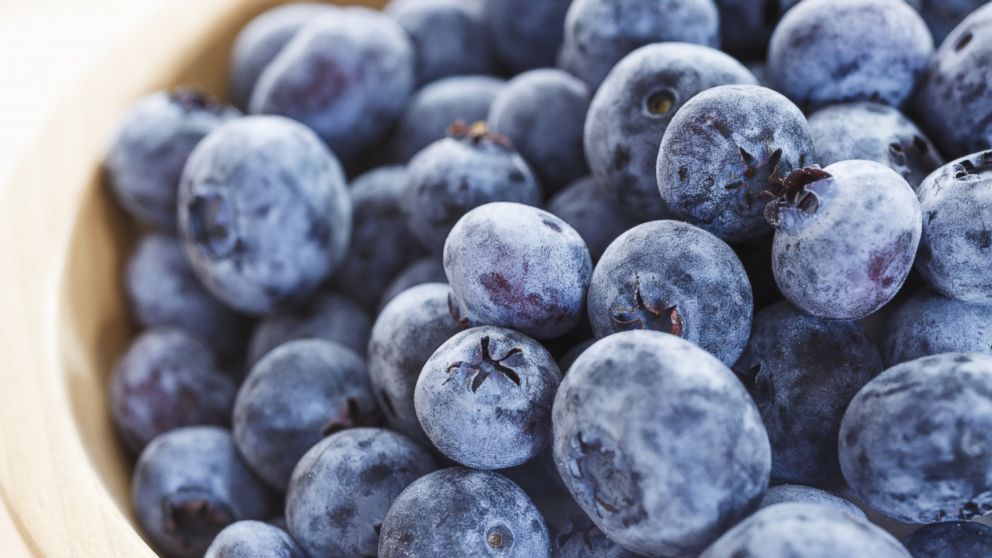5 Reasons to Eat More Blueberries
These tiny wonders pack some serious health perks.

— -- intro: July marks National Blueberry Month. It’s hard to believe these tiny wonders have been around for more than 13,000 years. Not only are they indigenous to North America, but blueberries also played a major role in our country’s history.
In the early 1600s, Native Americans relied on the fruit as both a food and medicine source, and legend has it that they were the first to introduce the Pilgrims to blueberries, according to the U.S. Highbrush Blueberry Council. Seeing as how one cup is only 84 calories and contains 24% of your recommended daily value of vitamin C and 114 milligrams of potassium, it’s no wonder they were such a big deal.
As if you needed any other reasons to eat blueberries, take a look at five more of the fruit’s superpowers.
Best Superfoods for Weight Loss
quicklist: 1category: Why You Should Eat More Blueberriestitle: They’re good for your bladderurl:text: A study in the Journal of Agricultural and Food Chemistry found that blueberries, like cranberries, contain special compounds that stop bacteria from multiplying and attaching to the bladder wall. Particularly, they’re good at warding off E. coli, a key instigator of many urinary tract infections (UTIs).
If you get UTIs and you don’t love cranberry juice, try eating more blueberries to help keep your bladder free of infection.
quicklist: 2category: Why You Should Eat More Blueberriestitle: They may guard against cancerurl:text: Ever wonder how blueberries get their blue color? It’s because they’re rich in anthocyanins, a type of antioxidant that’s also been shown to have some serious cancer-fighting effects.
In the same study above, the blueberries with the most anthocyanins were able to stop the growth of prostate and liver cancer cells in mice.
30 Healthy Foods That Could Wreck Your Diet
quicklist: 3category: Why You Should Eat More Blueberriestitle: They can boost your brainpowerurl:text: Another antioxidant found in blueberries: flavonoids. Some research has suggested these compounds may improve learning and cognition.
A study in the Annals of Neurology found that women with the highest intake of berries appeared to delay cognitive decline by up to 2.5 years. So eating blueberries may just work wonders on your memory as you get older.
quicklist: 4category: Why You Should Eat More Blueberriestitle: They reduce inflammationurl:text: Inflamed arteries can be a major bummer for heart health. Once your arteries become inflamed, they start to narrow, increasing the chance for a blockage to occur. Once plaque starts to build up, you can develop a condition called atherosclerosis that may lead to other cardiovascular diseases.
Good thing that research shows blueberries have excellent inflammation-fighting properties. One mouse study in Molecular Nutrition & Food Research found blueberries can stifle the production of two inflammation-promoting proteins that may spark the condition.
Even better, a more recent study from the Harvard School of Public Health reported that eating three or more servings of blueberries and strawberries per week might slash a woman’s risk of heart attack by a third. Scientists chalked this up to the anthocyanins’ ability to dilate arteries and counter plaque buildup. More good news for your heart.
14 Foods That Fight Inflammation
quicklist: 5category: Why You Should Eat More Blueberriestitle: They promote better digestionurl:text: There’s been a lot of talk about the health benefits of probiotics, the good bacteria that can reduce growth of the harmful stuff and keep your digestive system functioning properly.
A study in the Journal of Agricultural and Food Chemistry found that men who consumed a daily wild blueberry drink for six weeks saw an increased concentration of two types of bacteria crucial for gut health. So snacking on blueberries more often could prove to be a huge relief for your digestive system, too.
This article originally appeared on Health.com.




